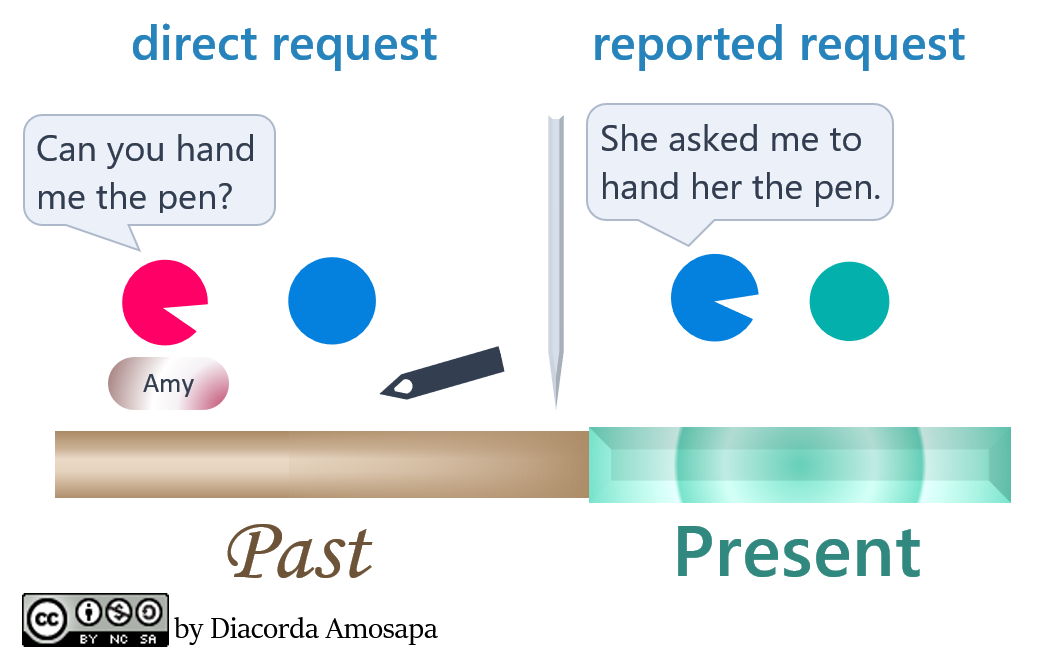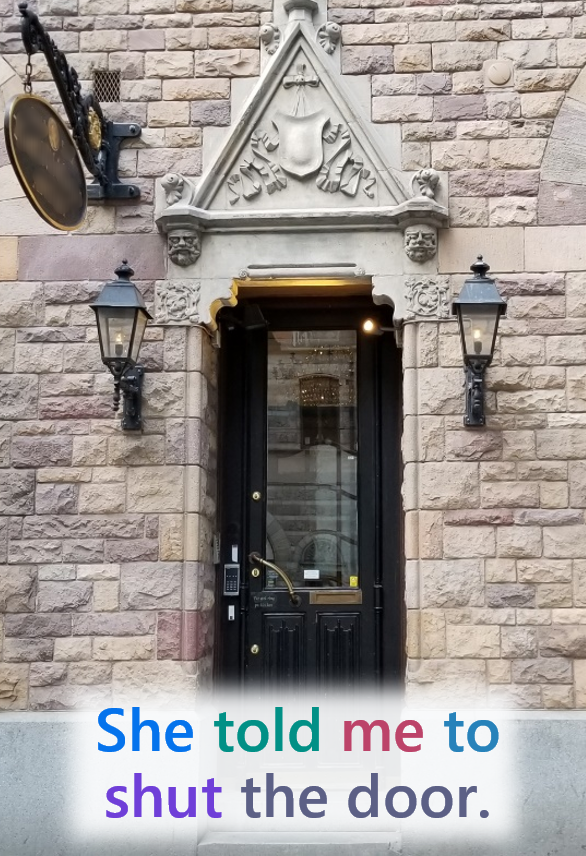Reported Requests, Suggestions, and Orders
In addition to reported statements and reported questions, we can report requests, suggestions, and orders. There is so much that we can talk about!
Reported Requests
When someone asks another person to do something, that request is not reported like statements nor questions. Instead, the request is shortened to: asked [person] to [base verb] plus the rest of the content.
DIRECT: “Could you kindly close the door please?” he said.
>> REPORTED: He asked me to close the door.
DIRECT: “Could you watch the children on Saturday?” Naomi asked.
>> REPORTED: Naomi asked me to watch the children on Saturday.
DIRECT: “Can you hand me that pen?” she asked.
>> REPORTED: She asked me to hand her the pen.
DIRECT: “Could you put the bags on the table?” Alex said.
>> REPORTED: Alex asked me to put the bags on the table.
Reported Suggestions
The reporting verbs that are often used for suggestions or advice include suggested, recommended, and proposed. There are two main ways to report suggestions. One way is to write or say that after the reporting verb, then identify the recipient of the suggestion/advice, then state the base form of the verb (also called an infinitive) from the direct suggestion or demand, followed by the rest of the content.
DIRECT: Perhaps you could talk to Zak about it,” Kevin said.
>> REPORTED: Kevin suggested that I talk to Zak about it.
DIRECT: “I think you should see a doctor,” she said.
>> REPORTED: She recommended that I see a doctor.
DIRECT: “Let’s study in the library,” he said.
>> REPORTED: He suggested that we study in the library.
DIRECT: “Why don’t you call Jen?” Latoya said.
>> REPORTED: Latoya recommended that I call Jen.
The structure after the suggestion/advice reporting verb can also begin with a gerund (a verb ending in ing that is used as a noun) and skipping the recipient of the suggestion.
Kevin suggested talking to Zak about it.
She recommended seeing a doctor.
He suggested studying in the library.
Latoya recommended calling Jen.
Reported Orders
Commands or orders are much stronger than requests or suggestions. A common reporting verb for an order is told. Other common reporting verbs include order and command. Otherwise the structure for reported orders is the same as reported requests.
DIRECT: “Shut the door,” she said.
>> REPORTED: She told me to shut the door.
DIRECT: “Everybody form a line!” he said.
>> REPORTED: He told us to form a line.
DIRECT: “Talk to Jen about it,” Zak said.
>> REPORTED: Zak told me to talk to Jen about it.
DIRECT: “Jason, turn right,” Sarah said.
>> REPORTED: Sarah told Jason to turn right.
Many orders are about telling people to NOT do something. To report these kinds of orders, add a not before the to.
DIRECT: “Do not walk on the new grass,” she said.
>> REPORTED: “She told us not to walk on the new grass.
DIRECT: “Don’t feed the ducks!” Mr. Brooks said.
>> REPORTED: Mr. Brooks told us not to feed the ducks.
DIRECT: “Do not run in the hallways!” Ms. Flores said.
>> REPORTED: Ms. Flores told them not to run in the hallways.
DIRECT: “Don’t block the entrance,” the employee said.
>> REPORTED: The employee told me not to block the entrance.
Practice
You can practice reported requests, suggestions, and orders with this exercise.
If you would like get more speaking and listening practice using reported speech and receive professional feedback to check whether you are using them and other important sentence structures correctly, you can email me at contact@englishtutordia.com to schedule your first free online consultation.








